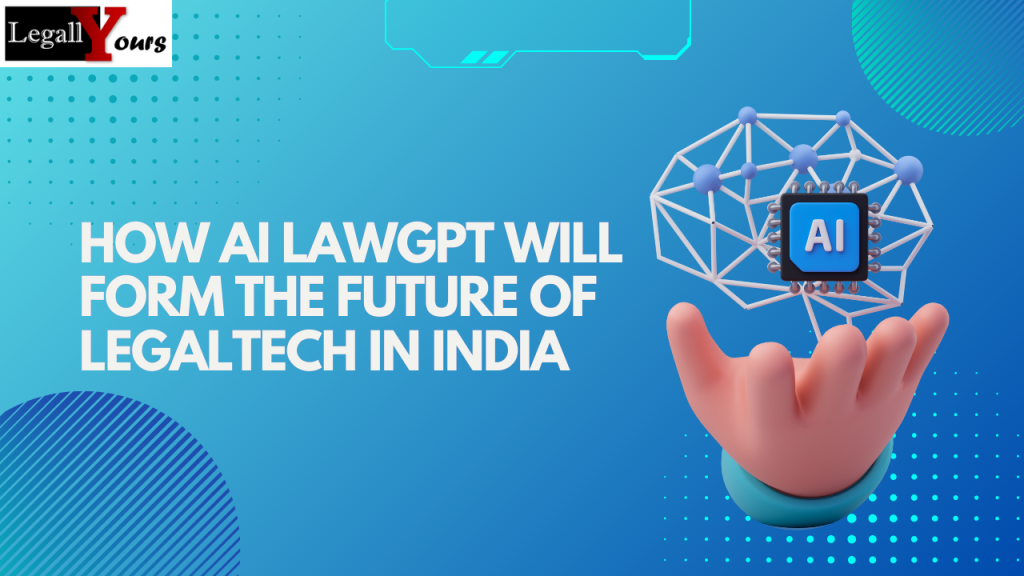One of the oldest legal systems in the world, the Indian system is very large, complicated, and even criticized as slow and overloaded. There is an increasing demand for technology-based solutions, as the number of cases pending and the demand for efficient legal services increase by millions. This is where Law AI tools like AI Law GPT are beginning to reshape the landscape of LegalTech in India. From AI legal research to online lawyer consultation, these advancements are not only reducing time and cost but also making legal services more accessible to common citizens.
In this blog, we will explore how AI Law GPT and other law AI solutions are revolutionizing the legal industry, why they are crucial for India’s justice system, and what the future of LegalTech looks like.
The Rise of LegalTech in India
LegalTech is the use of technology in an attempt to simplify the legal process, offer smarter legal solutions, and enhance access to justice. As the U.S. and the U.K. are already adopting AI-based legal tools, now AI legal platforms are on the rise in India.
The growth has been driven by some major factors that include:
- Courts are overloaded with a backlog of over 40 million cases.
- High costs of traditional legal consultations.
- Growing digital adoption among Indian citizens.
- Demand for transparency and speed in legal services.
AI Law GPT is emerging as one of the most promising solutions, bridging the gap between advanced law AI and India’s diverse legal system.
What is AI Law GPT?
One of the newest and sophisticated AI legal tools that helps lawyers, businesses, and individuals to address legal work more efficiently is AI Law GPT. Being driven by natural language processing (NLP), it can process large volumes of legal information, produce insights into cases, and even help to find an online lawyer consultation by answering preliminary questions.
Some of its outstanding features are:
- Automation of legal research – Scan thousands of case laws, statutes and judgments within a short time.
- Drafting support – Assisting in creating contracts, agreements, and petitions.
- Client interaction tools – Enhancing online lawyer consultation with instant responses.
- Predictive analysis – The ability to give an insight about the outcomes of possible cases according to the judgment of the past.
AI Law GPT guarantees precision, efficiency, and cost-effectiveness by integrating technology and the skills of the professionals in the legal field.
How Law AI is Transforming Legal Services in India
1. Faster Legal Research
Conventional legal research may require days, or even weeks. Lawyers can retrieve the pertinent precedents and judgments in a few seconds using law AI tools such as AI Law GPT. This saves time as well as enhances the quality of the arguments in court.
2. Affordable Online Lawyer Consultation
The high cost of legal consultation is one of the major problems that ordinary citizens face. By delivering instant advice on frequent legal matters, including property cases, contracts, or family law matters, AI Law GPT based platforms are making the online lawyer consultation more affordable.
3. AI Legal Drafting
The writing of legal documents must be accurate. AI Law GPT can assist lawyers in writing contracts, wills, agreements, and petitions, minimizing errors and following the Indian laws. This allows legal services to be more trustworthy and affordable to startups, businesses and individuals.
4. Predictive Justice
With AI legal analytics, applications such as AI Law GPT have the potential to analyze past court rulings to forecast possible results. Although AI cannot substitute a decision made by a judge, it assists clients and lawyers to determine the risks and strength of a case prior to proceeding.
5. Increased Access to Justice
In rural India, legal services are often scarce. With online lawyer consultation powered by AI Law GPT, people in smaller towns and villages can connect with qualified lawyers virtually, breaking geographical barriers.
Challenges of Implementing AI Legal Tools in India
While the potential of AI Law GPT is enormous, there are challenges that need to be addressed:
- Data Privacy and Security – Legal data is highly sensitive. Ensuring confidentiality while using law AI platforms is crucial.
- Precision of AI Legal Outputs – AI needs to be trained significantly on Indian case laws and statutes to prevent inaccuracies.
- Resistance to Change – Not all traditional lawyers are accustomed to manual processes and they might be reluctant to accept AI legal solutions.
- Regulatory Framework – India should have a robust regulatory framework to ensure the use of AI in the law to ensure ethical use as well as to avoid abuse.
The Role of Online Lawyer Consultation in the AI Era
With the rise of digital adoption, online lawyer consultation has become one of the most sought-after services in India. AI Law GPT is taking this further by acting as a virtual legal assistant, offering:
- Instant answers to frequently asked legal questions.
- Appointment scheduling with lawyers.
- Pre-consultation notes, helping lawyers save time during actual meetings.
To illustrate, law AI tools can be used by a small business owner to create an employment agreement and then virtually consult with a lawyer to review it. This reduces costs and speeds up the legal process significantly.
The Future of LegalTech in India with AI Law GPT
The next decade will see exponential growth in AI legal solutions across India. Here’s what the future may hold:
- Hybrid Legal Systems – AI tools like AI Law GPT will work alongside human lawyers to provide efficient services.
- 24/7 Legal Assistance – Citizens will have access to legal help anytime through online lawyer consultation platforms.
- Integration with Courts – Indian courts may adopt law AI systems for managing case flow, scheduling hearings, and drafting automated orders.
- Legal Education Transformation – Law schools in India will incorporate AI-based tools like AI Law GPT to train future lawyers.
- Wider Access to Justice – With reduced costs and improved efficiency, even low-income citizens will benefit from legal support.
Why India Needs Law AI Today
India’s legal system is at a tipping point. With increasing case backlogs and limited resources, relying solely on human effort will not be enough. The AI Law GPT and other law AI tools are not intended to be used in place of lawyers but to empower them. AI tools will help lawyers to focus on strategy, advocacy, and client relationships by providing automation for repetitive tasks.
Moreover, for citizens, AI legal solutions combined with online lawyer consultation make justice more transparent, affordable, and within reach.
Conclusion
The future of LegalTech in India is, undoubtedly, connected with the improvement of the law AI. AI Law GPT is not simply another technology, it signifies a paradigm shift in the delivery, access and experience of legal services. It can transform the justice system in India by making it possible to quickly conduct research and book online consultations with lawyers at low costs, and predictive analysis.
Although issues of data security and regulations persist, the reward of implementing AI legal tools is much greater than the risk. The legal ecosystem in India is in the brink of reinvention, and AI Law GPT will be in the center of the reinvention.
With technology still developing, there is little doubt that AI Law GPT and other law AI solutions will be the foundation of the future of LegalTech in India.










